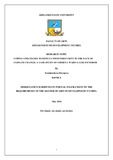Please use this identifier to cite or link to this item:
https://cris.library.msu.ac.zw//handle/11408/3072Full metadata record
| DC Field | Value | Language |
|---|---|---|
| dc.contributor.author | Taruberekera, Zivengwa | - |
| dc.date.accessioned | 2018-06-05T14:46:29Z | - |
| dc.date.available | 2018-06-05T14:46:29Z | - |
| dc.date.issued | 2016 | - |
| dc.identifier.uri | http://hdl.handle.net/11408/3072 | - |
| dc.description.abstract | This study focused on the effectiveness of the coping strategies to reduce food insecurity in the face of climate change, in Chireya ward 5 in Gokwe North Midlands Province, Zimbabwe. Using information from 64 participants that included 64 respondents mixed research approach was used, the research design was a case study that included residents, organizations A to C. The research made use of three data mining instruments which were Focus Group Interviews (FGDs), semi structured interviews, and observations. Findings revealed that agriculture production is on the decreased while food insecurity is on its rising limb. Preliminary results indicated that rainfall and temperature variability have negatively impacted the area under study negatively on their livelihoods, that left many relying on donations. Farmers in Chireya had different perceptions on climate change, the residents were blaming the people’s divergence from traditional while the organizations A,B and C had the human activities like pollution and poor environmental management to blame. The study further revealed that households in Chireya ward 5 uses different coping strategies to cope with climate change in order to be food secure. However many of the strategies they use were reported to be ineffective since they do not have sustainability instead they worsen the livelihoods. The study revealed that the households that do not have the assets were finding it difficult to cope effectively, than those with better assets. The recommendations were that the government should bear with the rural communities in its annual planning and that the rural communities and women should be participating and have decision making in projects that benefit them. Income generating projects and water harvesting as well as changing planting dates were some of the recommendations given following the fact that they were one of the effective coping strategies to reduce food insecurity in the face of climate change | en_US |
| dc.language.iso | en | en_US |
| dc.publisher | Midlands State University | en_US |
| dc.subject | Climate change | en_US |
| dc.subject | Food security | en_US |
| dc.subject | Livelihoods | en_US |
| dc.subject | Coping | en_US |
| dc.subject | Assets, awareness | en_US |
| dc.title | Coping strategies to reduce food insecurity in the face of climate change: a case study of Chireya ward 5; Gokwe north | en_US |
| item.fulltext | With Fulltext | - |
| item.languageiso639-1 | en | - |
| item.grantfulltext | open | - |
| Appears in Collections: | Master Of Arts In Development Studies | |
Files in This Item:
| File | Description | Size | Format | |
|---|---|---|---|---|
| TARUBEREKERA ZIVENGWA.pdf | Full Text | 1.65 MB | Adobe PDF |  View/Open |
Page view(s)
348
checked on Jan 1, 2026
Download(s)
658
checked on Jan 1, 2026
Google ScholarTM
Check
Items in MSUIR are protected by copyright, with all rights reserved, unless otherwise indicated.



